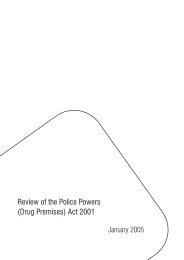Crimes (Forensic Procedures) Act 2000 - NSW Ombudsman - NSW ...
Crimes (Forensic Procedures) Act 2000 - NSW Ombudsman - NSW ...
Crimes (Forensic Procedures) Act 2000 - NSW Ombudsman - NSW ...
You also want an ePaper? Increase the reach of your titles
YUMPU automatically turns print PDFs into web optimized ePapers that Google loves.
For volunteers aged 10 to 14, our view is that the current position should remain – that forensic procedures can<br />
be conducted with the consent of the child’s parent or guardian, provided the child does not object to or resist<br />
the procedure. 678 While the <strong>Act</strong> does not explicitly require the consent of the child, our recommendation 13, about<br />
providing information about forensic procedures to child volunteers, would increase the child volunteer’s participation<br />
in the process.<br />
Recommendation 27<br />
The <strong>Crimes</strong> (<strong>Forensic</strong> <strong>Procedures</strong>) <strong>Act</strong> <strong>2000</strong> be amended in respect of the child volunteer provisions for<br />
children aged between 15 and 17, allowing these children to consent to forensic procedures for within case<br />
matching or limited purposes on their own behalf.<br />
<strong>NSW</strong> Police supports this recommendation. 679<br />
7.5.4. Authorisation by consent on behalf of an incapable person<br />
A forensic procedure may be carried out on a volunteer who is an incapable person with the consent of the person’s<br />
parent or guardian, provided the person does not object to or resist the procedure. 680<br />
The Intellectual Disability Rights Service argued that it was inappropriate to permit the parent or guardian of an<br />
incapable person to consent to a forensic procedure on the person’s behalf, describing it as “scandalous” that<br />
“someone who is not in a position to consider his or her own interests can be ‘volunteered’ by a third person to give a<br />
DNA sample to police.” 681<br />
In our view, there are clearly some circumstances where it is appropriate to allow a parent or guardian to authorise<br />
a forensic procedure being conducted on an incapable person, for example where a DNA sample is taken for the<br />
purpose of elimination, and the person’s DNA profile is not matched against anything else on the DNA database.<br />
However, we understand concerns about a parent or guardian being able to consent to a procedure on behalf of an<br />
incapable person, given that:<br />
• The parent or guardian may authorise the use of the person’s DNA profile for “unlimited purposes,” which<br />
includes criminal investigations and any other purpose for which the DNA database may be used.<br />
• The parent or guardian may specify the length of time for which the person’s DNA profile is to be retained on<br />
the DNA database.<br />
There are good reasons why DNA profiles obtained from volunteers who are incapable persons should only be used<br />
within the case for which the sample was provided, and should not be matched against any other indexes on the DNA<br />
database. This is in effect a balance between the competing considerations. We note that this is in effect, the present<br />
practice of DAL.<br />
7.5.5. Use of forensic material provided by child or incapable volunteers<br />
In our draft report, we made a provisional recommendation, that the <strong>Act</strong> be amended “to provide that where a forensic<br />
procedure is conducted on a volunteer who is an incapable person, and a DNA profile obtained, the profile only be<br />
used within the case for which it was provided, and not permitted to be matched against any other indexes on the<br />
DNA database.” The Attorney General’s Department commented that this recommendation seems appropriate,<br />
and that it “appears to simply propose that the existing practice regarding incapable persons be formalised in<br />
legislation.” 682<br />
<strong>NSW</strong> Police, however, did not support the recommendation, on the basis that it “can foresee circumstances where it<br />
may be in the interests or at the request of such a volunteer, for example in relation to missing persons.” 683<br />
We remain of the view that an incapable person’s parent or guardian should not be able to authorise use of the<br />
person’s DNA profile for “unlimited purposes.” If the person’s DNA profile were needed for purposes other than<br />
the case for which it was provided, it would be more appropriate for a court to determine whether the sample<br />
should be taken, rather than the person’s parent or guardian. We also consider this safeguard should apply to<br />
child volunteers as well as incapable adults. For these reasons, we now recommend that where police seek to<br />
<strong>NSW</strong> <strong>Ombudsman</strong><br />
DNA sampling and other forensic procedures conducted on suspects and volunteers under the <strong>Crimes</strong> (<strong>Forensic</strong> <strong>Procedures</strong>) <strong>Act</strong> <strong>2000</strong> 121

















